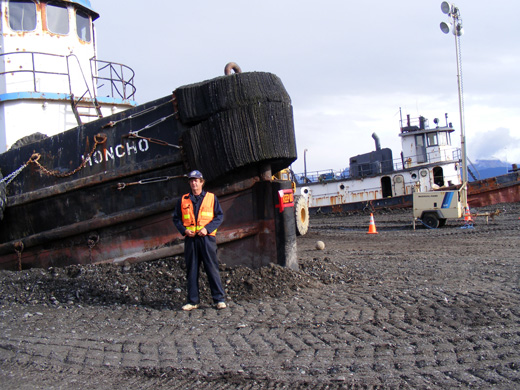Historic, but derelict, ships to be
salvaged for new recycled use of steel
Work began Monday cleaning the M/V
Spanky Paine and the M/V Honcho to prepare them for scrapping and eventual
recycled use on the international metals market.
Peninsula Scrap and Salvage are the new
owners of the derelict ships, after the City of Homer Homer Port
 |
HOMER TRIBUNE/Naomi Klouda -
|
“We’re getting the last commercial
value out of them by breaking them down,” said Harbor master Bryan Hawkins. It
also means the ships’ salvageable parts aren’t going to be wasted.
Hawkins is asked why the harbor doesn’t
scuttle old ships, but explains that’s not always an option.
“Scuttling is a long process, and they
have to be certified clean. That’s pretty tough when there are lead-based
paints, not just oils. It’s pretty extensive what you have to go through,”
Hawkins said.
Kevin Hatten, the project foreman for
Peninsula Scrap, said people interested in the ships have stopped by for a last
look. A few have asked for the antique portholes.
 |
Spanky Paine, right, is moored next to
the Honcho, left, at the
|
“I tell them, if they want a porthole,
make a donation of $99 to the Pratt Museum or the Sea Life Center
The Homer Playground Project is
interested in one of the Spanky Paine’s giant cleats, which Hatten said they
will try to salvage for them.
The Spanky Paine, originally called the
USRC Calumet, had a grand history stretching 117 years. The Honcho is more of a
mystery.
“I was told she barged vehicles between
Seattle and Honolulu
According to the U.S. Coast Guard
registry of ships, the Honcho was built in 1943. Where and why isn’t recorded.
The Spanky Paine was one of the
steel-hulled steamships by celebrated shipbuilder David Bell of Buffalo , N.Y.
 |
The Spanky Paine, a 115-year-old steel
tugboat that fought for the U.S. Navy in the Spanish American War, sits
abandoned in the Homer Harbo
|
The Calumet was sold to the U.S. government for $38,500 and was commissioned
Oct. 18, 1894 for service on the Great Lakes, stationed out of Chicago
She was commanded by 1st Lt. W. H.
Cushing of the U.S. Revenue Cutter Service, operating on vital coastal patrol
duty to guard against the possible approach of enemy ships.
The vessel was commissioned for service
with the Navy again during World War I, where she hauled war supplies and
troops. Following the war, she was transferred back to the U.S. Treasury
Department in 1919 and renamed “Tioga” in 1934. Tioga was transferred to the
Navy for a third time during World War II.
The Navy decommissioned the Tioga on
Oct. 14, 1946, and sold it months later to the New Haven Towing Co. of New
York. There, the tug was then given its third name: the “John F. Drews.”
The “John F. Drews” sold again into
private ownership in 1950 to the Whaling City Dredge and Dock Corp. of Groton , Conn. New Haven , Conn. , in Long Island Sound while being towed to Groton Toronto ,
Ontario , Canada Cleveland , Ohio
In 1967, the ship was sold again, this
time to the Dunbar and Sullivan Dredging Co. of Detroit, Mich. Alaska owner after being renamed “Spanky
Paine” by Fred Paine of Superior
The ship left for Alaska
After that chronology, not much on the
Spanky Paine survives of its original. The steel hull looks like its been
mended many times over. “See all those seams? That shows how many times they
had to go over it for repairs. The hull is likely the only thing original still
there,” Hatten points out. “Not many of the bells, lights or anything else
remain.”
So far, about 300-400 gallons of waste
oil are identified for removal on the Honcho. The Spanky Paine hasn’t been
assessed yet. The winches from each tug is going to a local for refurbishing at
a discounted price.
Hatten figures the project will take
about a month to complete.
Source: Homer Tribune. By Naomi Klouda. 5 October 2011
http://homertribune.com/2011/10/last-docking-for-spanky-paine-honcho/
No comments:
Post a Comment